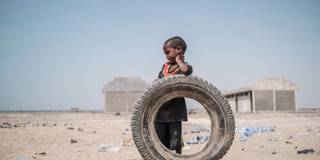Owing to pre-existing conditions such as poverty, food insecurity, displaced populations, and armed conflicts, Africa is uniquely vulnerable to the disruptive effects of climate change. Making matters worse, the global climate agenda continues to overlook the continent's needs.
ABUJA – Through many years of work to support effective political leadership and sound governance in Africa, I have seen the continent confront immense challenges, not least during the COVID-19 pandemic. But there is one major issue that continues to be largely ignored: Africa’s unique position in the climate crisis.
For many communities across the continent, the climate threat is already existential. Vast swaths of Africa are becoming uninhabitable, and immense reserves of natural wealth – tropical forests, arable lands, freshwater ecosystems, and coastlines – are being degraded. This is a grave injustice. Africa is suffering the most from a problem that it did the least to cause. Worse, in the run-up to this year’s COP27 climate conference, Africa’s specific challenges – as well as the continent’s potential to contribute to a low-carbon future – have been overlooked in global climate discussions.
The current global climate agenda is failing Africa’s people by focusing on emissions reductions above all else. This obsession with mitigation ignores Africa’s pressing need for adaptation financing and “loss and damage” compensation. Moreover, global commitments to phase out international fossil-fuel financing threaten to obstruct Africa’s own industrialization efforts.

ABUJA – Through many years of work to support effective political leadership and sound governance in Africa, I have seen the continent confront immense challenges, not least during the COVID-19 pandemic. But there is one major issue that continues to be largely ignored: Africa’s unique position in the climate crisis.
For many communities across the continent, the climate threat is already existential. Vast swaths of Africa are becoming uninhabitable, and immense reserves of natural wealth – tropical forests, arable lands, freshwater ecosystems, and coastlines – are being degraded. This is a grave injustice. Africa is suffering the most from a problem that it did the least to cause. Worse, in the run-up to this year’s COP27 climate conference, Africa’s specific challenges – as well as the continent’s potential to contribute to a low-carbon future – have been overlooked in global climate discussions.
The current global climate agenda is failing Africa’s people by focusing on emissions reductions above all else. This obsession with mitigation ignores Africa’s pressing need for adaptation financing and “loss and damage” compensation. Moreover, global commitments to phase out international fossil-fuel financing threaten to obstruct Africa’s own industrialization efforts.